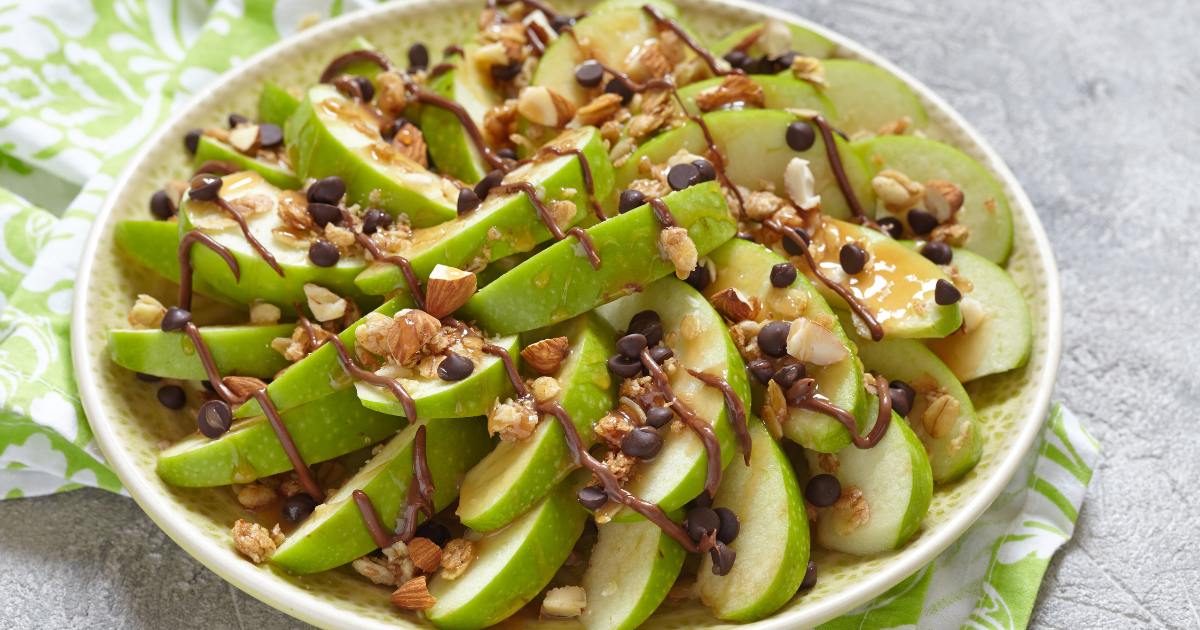Raise your hand if you find yourself rummaging through your desk drawer, lunch bag or the vending machine looking for a pick-me-up healthy snack at 3pm on a work day? You are not alone. Generally a snack is defined as a food item that is consumed between meals (i.e. breakfast, lunch, dinner). Confusion arises because both nutrient poor (e.g. cookies) and nutrient dense (e.g. fruit) foods are coined as snacks. With all the different health claims associated with various foods, it can be challenging to determine whether the food is actually healthy or not. Below are five common foods that are marketed as very healthy, but they are not all that they’re cracked up to be.
TRAIL MIX
Who wouldn’t jump at the opportunity to consume a “healthy snack” containing mostly chocolate, nuts and dried fruit? Trail mix is loaded with fat (saturated and unsaturated), sugar and calories – fibre and protein content vary between the ratio of ingredients. This energy dense snack is a suitable option for people engaging in energy-demanding activities (e.g. hiking trails). Given how much energy is loaded in a small amount of volume, excessive consumption can contribute to weight gain. Case in point: one quarter cup trail mix can provide 210calories, 12g of fat (3g saturated), 15g sugar and 1g fibre while 1oz unsalted almonds and 1/2c blueberries provides 200calories, 14g of fat (1.0g saturated fat), 8g sugar and 5g fibre.
Diet incorporation:
The best way to incorporate trail mix into ones’ diet is to make it yourself using raw and unsalted nuts, raw unsalted seeds, and unsweetened dried or fresh fruit. If you really want to add more flavour and texture add dark chocolate, popcorn, cinnamon and/or nutmeg. Remember, portion control is essential if your goal is weight loss or maintenance.
GRANOLA
Granola is energy dense. When made with real ingredients, it has a place in ones’ diet. Since manufactured granola is highly processed and contains added sugar and oil, overconsumption can contribute to weight gain. For individuals partaking in certain activities (e.g. hiking trails) and require quick energy from carbohydrates, granola can be a snack option. Case in point: half a cup of granola provides 280calories, 12g of sugar and 4g of protein while one cup of all bran flakes can provide 120 calories, 5g of sugar and 5g of fibre.
Diet incorporation: To satisfy that crunch that granola provides, make your own granola at home with the ability to control the ingredients or opt for chia seeds, hemp seeds, unsalted/raw nuts, oats or bran buds/flakes.
DRIED FRUITS
Dried fruits have a place in a well-balanced diet, but eaters beware – when consumed in excess, the high sugar and caloric content can contribute to weight gain. While they can make a great addition to trail mix, baked goods and salads, it is easy to overconsume these delicious, low volume and energy-dense snacks. Case in point: one quarter cup dried cranberries provides 140 calories, 27g sugar, and 2g fibre while half a cup of fresh cranberries provides 30 calories, 5g sugar, 2g fibre.
Diet incorporation: Choose fresh or frozen fruit more often, but when choosing dried fruit opt for the unsweetened version and limit the portion consumed.
FROZEN YOGURT
Frozen yogurt is often marketed as a healthy option, but don’t be fooled though. Manufactures promote frozen yogurt as a better option than ice cream as the base is made from milk and not cream. It’s not uncommon to see that the difference in fat content is made up through the addition of more sugar. Frozen yogurt is often accompanied by high sugar toppings (e.g. chocolate, marshmallows, candy, and syrups) which means calories can add up quickly. Case in point: 1/2c of vanilla frozen yogurt with 1 tablespoon of chocolate chip provides 185calories, 8g fat, and 25g sugar while 1/2c of vanilla frozen yogurt with 1/2c of strawberries provides 140calories, 4g fat, 24g sugar, 3g fibre.
Diet incorporation: Choose the smallest size of frozen yogurt with various fresh fruits as toppings and treat frozen yogurt as you would any other dessert (i.e. limit frequency of consumption).
GRANOLA BARS
Many granola bars are also known as the glorified candy bar. While not all granola bars are made equally, many of the manufactured granola bars contain several sources of sugar (e.g. corn syrup, honey, chocolate, dried fruit, agave syrup), and small amounts of protein and fibre. Some granola bars however, can be consumed as a healthy snack option. They key is to compare the granola bars by reading the nutrition facts table, nutrition claims and ingredient list.
Diet incorporation: When choosing granola bars the first listed ingredient should be whole and natural (e.g. whole oats, whole grain) and sugar should not appear within the first three ingredients. As my rule of thumb a granola bar should contain minimally 3g of fibre, 4g of protein, no more than 8g of sugar and 2g of saturated fat with 0g of trans fat.



